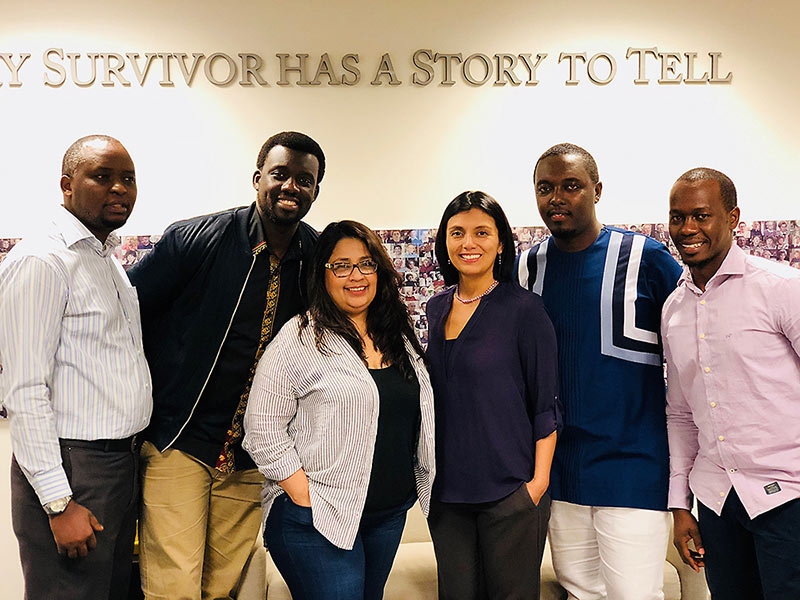Aegis education team dives deep into IWitness during visit to Institute

In Rwanda, where the 1994 Genocide against the Tutsi remains a fresh wound, education is a critical piece of promoting lasting peace.
A group with Aegis’s education team in Rwanda has concluded a three-week visit with the Institute to develop expertise for accessing testimony in IWitness, create testimony-based educational content for local educators and establish plans and expectations for the next phases of our partnership.
As a component of the multi-year relationship, Aegis has collected testimonies and made them available to the world through USC Shoah Foundation’s Visual History Archive. (The testimonies also live in Aegis’s Genocide Archive of Rwanda.)
The Institute, in turn, has been working closely with Aegis staff over the years to develop and test testimony-based educational resources in Rwanda, but are now looking towards the next steps and the sustainability of our work in the region.
For three weeks ending Feb. 9, Jean Nepo Ndahimana, Pierre Claver Irakoze, Enoch Ssemuwemba and Marc Gwamaka worked together with the Institute’s education team to build expertise on how to use and create IWitness activities for educators and youth throughout Rwanda.
Over the course of their stay, the team built six IWitness activities focused on peace building in Rwanda, where, in 1994, nearly 1 million were killed during the Genocide against Tutsi, over a period of about 100 days.
The first to go online will focus on Propaganda and Social Cohesion, which will be available for teachers and students by Tuesday, Feb. 13.
The efforts to advance testimony-based education in the country gained momentum following the successful Rwanda Peace Education Programme (RPEP), which aimed to advance peace education in Rwandan schools and resulted in the inclusion of both peace and values education and IWitness into the new Rwandan national curriculum.
The visit from the Aegis education team is mutually beneficial. While Aegis gains knowledge about how to use testimony effectively in educational settings via an existing education platform that has global impact, the Institute benefits from the know-how of Rwandan educators who can create more IWitness content for Peace and Values Education. The Institute and Aegis are also updating and improving the Rwandan global program page in IWitness and creating a teacher’s guide in support of the implementation of Rwanda’s national curriculum, through the lens of peace and values education.
“The idea is to help Aegis build their capacity to further the work the Institute has already initiated, develop the resources and activities that will allow for the implementation of the national curriculum by leveraging both the Institute’s and Aegis’s expertise,” said Dr. Claudia Wiedeman, the Institute’s director of education.
The resources will be integrated into the programming at two peace centers, one of which is at the Kigali Genocide Memorial Centre, one of six major memorial centers in Rwanda that commemorates the genocide.
“There is no way people can learn and prevent genocide if they don’t know about genocides that happened,” said Claver. “Reconciliation is a process, and knowing what happened is important to support this process.”
In support of this work, the Kigali Genocide Memorial Centre in Rwanda will host a dedicated space that supports digital learning via IWitness, which makes audiovisual testimonies of survivors and witnesses of genocide and mass atrocity accessible to educators and students worldwide. The dedicated space at the center will also include offline testimony-based education.
The flexible space will accommodate professional development programming for educators, as well as the direct classroom instruction of visiting students. For ongoing program development, the classroom will serve as a digital laboratory for video editing, building IWitness activities, and other testimony-based research and education workshops. The center will impact thousands of Rwandan students who visit the Kigali Genocide Memorial Centre every year.
Aegis’s work over the past three weeks will bring to 20 the number of IWitness activities that feature the testimonies from survivors and witnesses to the Genocide against the Tutsi; that number is expected to grow through the partnership.
The ultimate aim is to increase the use and impact of testimony-based education in Rwanda and to help Rwandan educators to fulfill the new national curriculum mandate, contributing to building a peaceful and cohesive society in Rwanda, said Lesly Culp, USC Shoah Foundation’s head of education programs.
“This is about building a country and community that can move beyond and prevent genocide from happening again,” she said. “It requires encouraging students to confront the history and think critically about it, and to learn from it.”